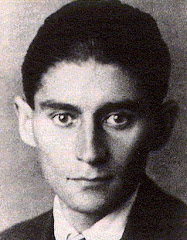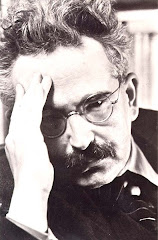Theoretically, Foucault is quite accurate. The beauty, however, is that there are moments in our life, moments in history, in which we can choose! Perhaps, this too, is a myth conditioned by the microphysics of power. Or perhaps, phenomenologically, in the words of Wallace Stevens, there are things "too actual," that " any imaginings of them" become "lesser things." If Stevens and the lyric poetry tradition carve out a space free from the law of non-contradiction, we can say that in certain sublime moments "sense exceeds all metaphor," or to put it in blunt, philosophical (Levinasian) terms, (ethical) experience ruptures the Totality and brings us before the Infinite.
Some might argue that Foucault still does not allow enough room for freedom or personal choice in the common sense understanding of these terms. But, Foucault is dialectical and we should be cautious. I think that Foucault is probably one of the most dialectical thinkers I've encountered, though in a completely different way than the dialectical tradition from Hegel and Marx to Adorno. As a result of Foucault's implicit dialectic, at once apparently nostalgic for a medieval, primitive past and condemning of all human societies from time immemorial, it is difficult to pin down what role he grants to choice or freedom. If power is always constitutive of our existence, then choice seems problematically constricted. But if the conditions of power change and can be seen as progressing or, most likely, regressing, then responsibility would be implied. Take for example, the History of Madness, in which Foucault proposes a historical moment in which reason subjugated un-reason. The oppression of the insanity ward is something that modernity can be held accountable for. Holding an age accountable is no less problematic than holding a people culpable. But I don’t think Foucault is a relativist; I think he simply cautions against seeing one’s own judgment as autonomous, omniscient, atemporal. The courage to condemn is something that has to be taken on with nuance and humility. Foucault’s affected nostalgia is his attempt at critique of the present. Nostalgia and critique go hand in hand, but nostalgia seems a more tentative way of lambasting the now. The “Fall” of the Bible, like the Falls described by Foucault from an Aristotelian naïveté to a Baconian obsession with positivism and domination make up our given conditions, our “throwness.” But what Foucault and other critical thinkers aim to do is show that such Falls are not predetermined and necessary, not part of the logical progression of the World-Spirit, but moments, which in retrospect take on the appearance of necessity, and with that, cement us into narrow worldviews that can only be liberated and expanded when we rethink our origins as contingent, and thus imagine other possible worlds. Contra Leibniz (a Hegelian before Hegel), who claims this world as the best of all possible worlds, Foucault challenges us to throw our foundations into question. His critiques, however, are far less pernicious and indicting than Adorno and Horkeimer’s and I feel like his protests can have room in a liberal society, more so than orthodox Marxist critiques. For Foucault would have his own critiques of any and all societies, and in this capacity, we should not see him as “an enemy of the open society,” but as its Socratic inner voice, constantly reminding us, “know thyself.”





